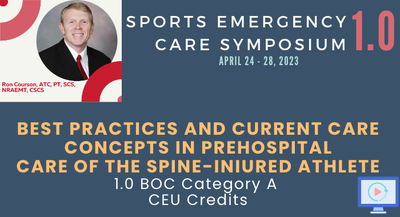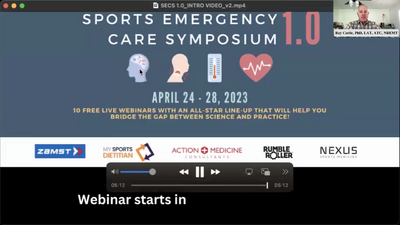Course Info (Description; Learning Objectives; Practice Gap; Clinical Bottom Line; Summary Conclusions)
Course Description:
This presentation will focus on the conclusions and recommendations of the best practices document, discussing how the recommendations will impact the EAP planning process, medical time-out prior to athletic events, clinical skill development, and the importance of team concept with rescuers from a variety of backgrounds and training (EMS, AT, MD).
BOC Domains of Athletic Training:
-
Domain I - Risk Reduction, Wellness, and Health Literacy
-
Domain II - Clinical Evaluation and Diagnosis
-
Domain Ill - Critical Incident Management
-
Domain V - Healthcare Administration and Professional Responsibility
Practice Gap:
Despite the importance of appropriate management of spine injuries, there exists a gap in the clinical practice of BOC athletic trainers and other providers regarding the latest national EMS spine injury standards and the different care options available in prehospital management of spine injuries. Furthermore, there is a need for BOC athletic trainers and other healthcare providers to review and improve their specialized techniques for transferring patients with spine injuries and football equipment removal techniques to ensure safe and optimal care for patients. Therefore, a comprehensive educational program on these topics is necessary to bridge this practice gap and enhance the quality of care provided by BOC athletic trainers in sports settings.
Upon completion of this course, participants will be able to:
- Provide an update on new national EMS spine injury standards
- Discuss different care options available in the prehospital management of spine injuries
- Review spine injury transfer techniques
- Review football equipment removal techniques
Clinical Bottom Line:
The clinical bottom line of this presentation is to emphasize the importance of incorporating the recommendations outlined in the best practices document to improve the EAP planning process, enhance clinical skill development, and emphasize the importance of a team concept among rescuers from various backgrounds and training (EMS, AT, MD). The presentation will provide an update on the latest national EMS spine injury standards, as well as discuss the different care options available for prehospital management of spine injuries, review specialized techniques for transferring patients with spine injuries, and review football equipment removal techniques. By implementing these best practices and recommendations, healthcare professionals can provide high-quality care to patients with spine injuries in sports settings and improve outcomes.
Summary Conclusions:
- Incorporating the best practices recommendations is crucial to improve EAP planning and clinical skill development.
- The latest national EMS spine injury standards will be discussed to ensure up-to-date knowledge.
- Different care options for prehospital management of spine injuries will be covered.
- Specialized techniques for transferring patients with spine injuries and football equipment removal will be reviewed.
- Emphasizing the team concept among rescuers with diverse backgrounds and training is essential for optimal patient outcomes.


